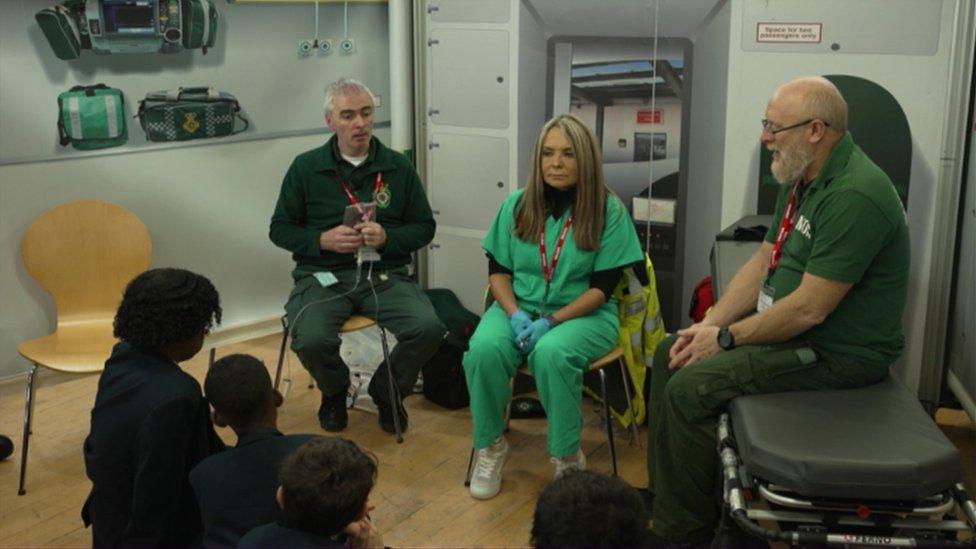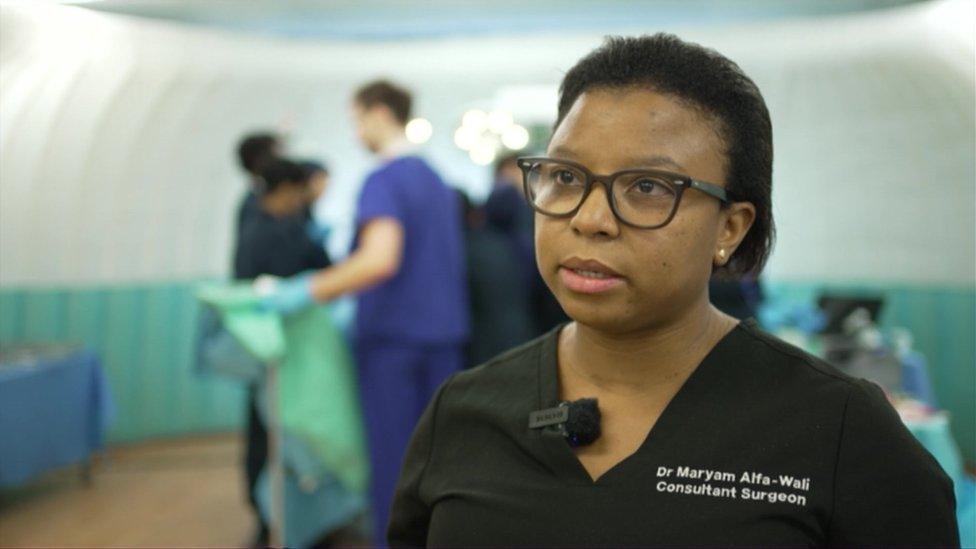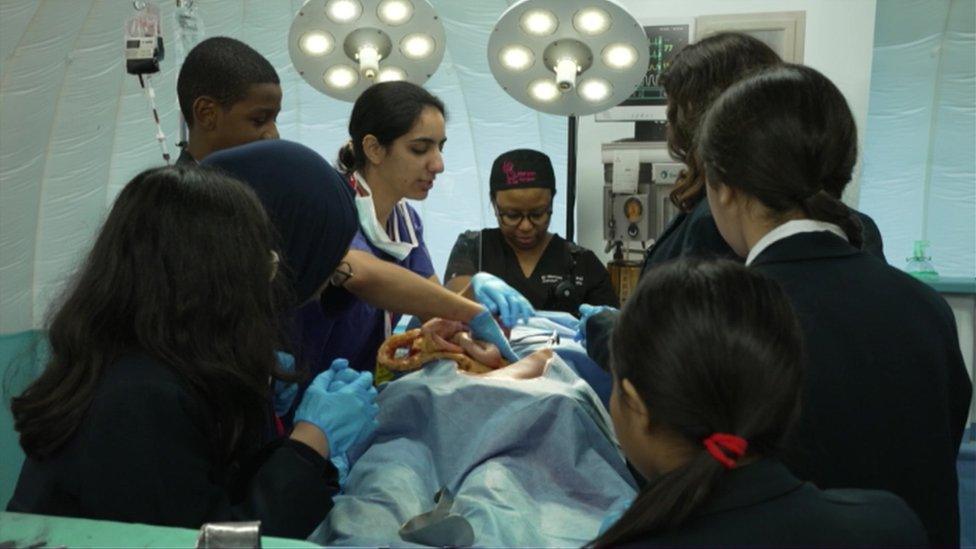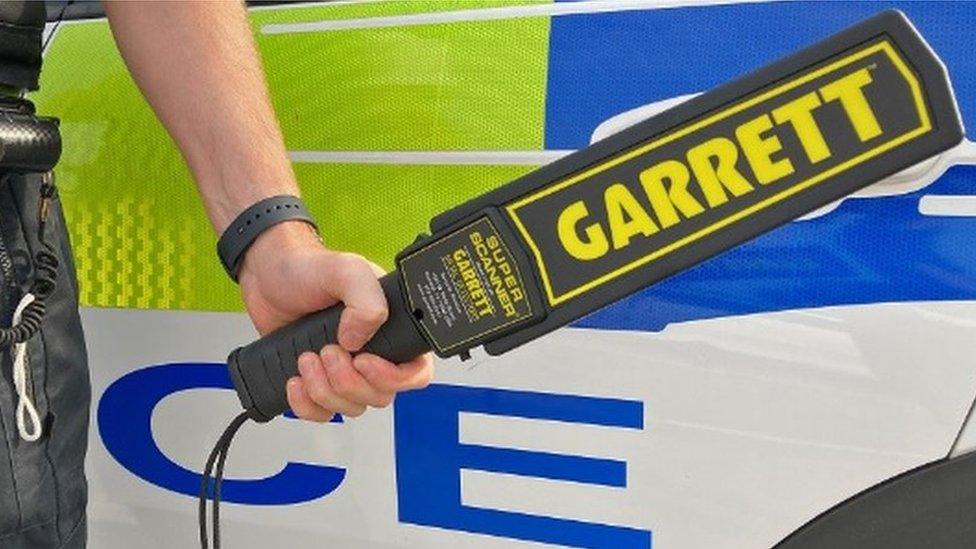Tackling knife crime through simulation
- Published

The SHARP project's Michael Laverty (left) said ambulance crews were slowly getting used to treating child victims of knife crime
Students are being shown dramatised scenes of a stabbing in a project about the long-term impacts of knife crime.
The SHARP project is encouraging 11 to 14-year-olds to reflect on how their lives could be permanently changed if they are the victim or attacker.
Project founder Prof Roger Kneebone, from Imperial College London, said "people at increasingly young ages are getting drawn into gangs".
This year, 16 teenagers have been fatally stabbed in London.
This article contains potentially distressing content.
Hamid Kanu, who is now youth ambassador for the Change Foundation, was stabbed on his 18th birthday.
The 25-year-old from Peckham said he was a part of the SHARP (Simulation-based Holistic Approach for Reducing & Preventing knife violence) project because children engage with him when they hear about "real-life experiences".
"Once I dive deep into my situation and show how it really affected me and everyone around me, I feel like it actually hits home to these kids," he said.
Michael Laverty, from the SHARP project, chose to get involved in the scheme because he lives in a borough with a high rate of knife crime.
He said the ambulance service was often dealing with children who have suffered traumatic knife injuries.
"We don't really get much preparation for that. But we are, slowly, almost becoming used to dealing with children involved in knife crime", he said.

Dr Maryam Alfa-Wali said children were often stabbed after school
'I can almost set my watch by it'
Dr Maryam Alfa-Wali, consultant trauma surgeon at the major trauma centre at St Mary's Hospital in Paddington, said surgeons were having to treat young people for injuries they "never thought they would have to deal with".
"I can almost set my watch by it," she said. "After school, you're expecting the trauma calls to be related to young people that have been stabbed.
"Not only that, they are scarred from surgery but also the psychological trauma that these young people end up having for the rest of their lives."

Knife crime in London
Knife crime has risen each year since the pandemic, with 13,503 incidents incidents recorded in the capital between July 2022 and June 2023, a 21% increase on the previous 12-month period.
However levels remain 8% lower than before the pandemic, the Office for National Statistics (ONS) said.
Knife detectors available for schools, says mayor
Between 2018 and 2022, the London Ambulance Service treated 1,113 males and 29 females aged 16 to 20 for knife injuries, a BBC London freedom of information request revealed.
In the same timeframe, it treated 212 boys and five girls aged 11 to 15.
In the capital, the highest numbers of knife or sharp instrument offences were recorded in Westminster, with 871 offences, or 426 per 100,000 people.
The lowest number of offences was in Richmond, with 110 offences, or 56 per 100,000 people.
Kensington and Chelsea saw the highest proportional decrease, of 11%, from 211 offences in 2021-22 to 187 in 2022-23, while Havering saw the highest proportional increase, of 44%, from 177 offences in 2021-22 to 255 in 2022-23.

Prof Kneebone said: "We've been working with 11 to 14-year-olds because we think that's an age when we can make a difference.
"Once they're in gangs, it's very difficult for them to get out," he said.
"They're being encouraged to carry knives because the sentences for carrying a knife is lower if you're younger, and so it is a reality that people are getting involved in this kind of thing at an increasingly young age."

Students are shown a simulated scene of an operating theatre
During simulated scenes, students at Paddington Academy, one of the schools taking part in the project, watched a real paramedic crew respond to a stabbing scenario, and real surgeons, anaesthetists and nurses in an operating theatre.
"We want them at a basic level to know what to do if somebody around them gets stabbed," Prof Kneebone added. "But we particularly want them to have a sense of what lies ahead."
One Paddington Academy student said the SHARP project was "very helpful".
"We're obviously young students in a country where stabbing has increased," she said. "I think it's very educational for us to learn how to prevent it and what to do when it happens."
Another pupil said that knife crime was becoming "normalised", but felt reassured by the project's teachings.
If you have been affected by any of the issues raised in this story you can visit BBC Action Line.

Listen to the best of BBC Radio London on Sounds and follow BBC London on Facebook, external, X, external and Instagram, external. Send your story ideas to hello.bbclondon@bbc.co.uk
Related topics
- Published13 October 2023
